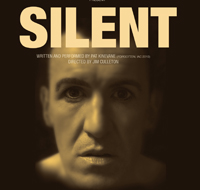There’s not too much that’s quiet about Pat Kinevane’s performance in his self-authored, one man play, Silent, now playing at the Donaghy Theatre in the Irish Arts Center. This is a piece that has shown some legs since it’s development through 2010 and performances in 2011, when it won prizes at the Edinburgh Fringe Festival, Brighton’s Argus Angel Awards, and accolades around Ireland. Energized by an electrifying performance from Kinevane, and a richly theatrical dramatization from both performer/author and his director Jim Culleton, it’s not difficult to see why it works so successfully as fine entertainment with a dark twist.
It emerges against a background of contemporary Irish theatre works that show a marked inclination toward the dramatically dark comedy. Stifling social mores work hand in hand with smothering familial circumstances, producing situations so bad that – well, you’ve got to laugh, haven’t you? In this bleak tale our narrator, Tino McGoldrig, a homeless wino on the Dublin streets, recounts his sorry history and the story of his tragic older brother, Pearse. Set in the present, as Tino tells it, there was a sustained small-town roughness, a narrow-mindedness to their upbringing in the picturesque town of Cobh, Co. Cork. We’re back in the world of Brinsley MacNamara’s Valley of the Squinting Windows, where the residents have little to do but shame and one-up each other, ever watchful for anything that might not conform to a coveted normalcy. Pearse, alas, is recognizably light in the loafers from an early age, and soon attracts the scorn and ridicule of his community. He is, however, surpassingly beautiful, and wins the attentions of a merchant seaman. Discovery and public disgrace follow soon after and from then on he is hounded, suffering threats of humiliation and physical violence at every turn. Young Tino observes all fretfully, but silently, happy in his own evasion of attention or accusation. Isolated and hectored, Pearse gives up in his teen years and commences a series of suicide attempts as coarsely comical as they are pitilessly unsuccessful. Stigma and shame attaches to the family and even though Tino struggles towards a blameless normal existence – marriage, and a child, and denial – guilt and depression overtake him and he succumbs to alcoholism and a downward spiral. He is thrown out of his home, debarred, and eventually institutionalized, ending up on the streets of the capital.
It’s baroque stuff, with a whiff of melodrama, but all retold in a caustic, unsentimental manner, swinging from the anecdotally ridiculous to the inflatedly operatic. The lost romance of the silent movie era is given some play – Tino and his father having been named in honor of Rudolf Valentino – and there are arresting sequences of old-school actorly projecting – smoldering dumb shows with opulent lighting effects and text placards. These passages are nicely foiled by Tino’s more natural, direct stage address, comprising elements of contemporary stand-up, satirical impersonation, and loquacious bar stool Blarney. Everything is punctuated by the recorded tinkle of a coin dropping into Tino’s pavement begging bowl, recalling us to the here and now, and Tino to his present predicament – the need to ‘perform’ for his supper.
Kinevane as Tino is mesmerizing, both to watch and to listen to. This is a performer as fully adept with traditions of physical theatre – mime, dance, voguing – as he is with vocal modulation – pitch, expression, mimicry. He even works in some audience interaction, relaxing the dramatic tension, just as easily as he can sharpen it, never losing control. This is a considerable asset, as in the final analysis, there is something over-long in the telling – a tendency to meander off on a riff that proves as compelling as the main narrative itself. If it’s possible for the teller to upstage his tale, then perhaps Kinevane is a bit guilty here. Tino’s life has been devoured by Pearse’s story, but Kinevane’s performance, in some measure, overwhelms his narrative. Whether you agree or not, it’s something to see.
In dramatic visualization, director and co-developer, Jim Culleton, displays insight and authority. Along with Kinevane, Culleton devised the lighting design. One wonderful scene – at a moment of high drama - deploys shadows thrown up on a backdrop as separate stage presences, heightening mood and tension. This high degree of imaginative thoughtfulness is consistent in Catherine Condell‘s simple, but supple costuming, and in the evocative sound design by Denis Clohessy. Taking a compelling lead from Kinevane, this condensed company have produced a work of elaborate theatricality, sounding a bold and refreshing note for theatre as theatre.
~~~ Silent Written and Performed by Pat Kinevane Directed by Jim Culleton Composed and Sound Design by Denis Clohessy . Irish Arts Center / The Donaghy Theater553 W. 51st StreetNew York, NY 10019
Located between 10th and 11th Avenues in association with Georganne Aldrich Heller .
September 6 – 23 Wednesday – Saturday | 8pm Sunday | 3pm
Running Time: 80 minutes
Admission: $30 non-members / $24 members









{ 0 comments… add one now }